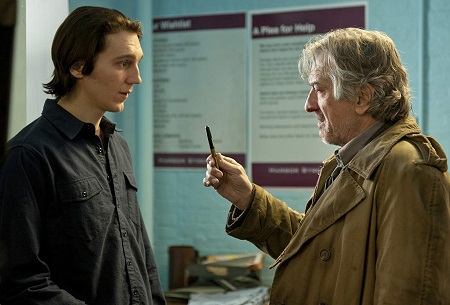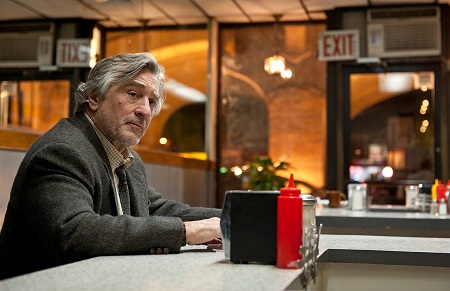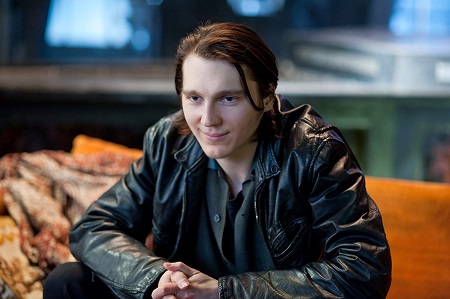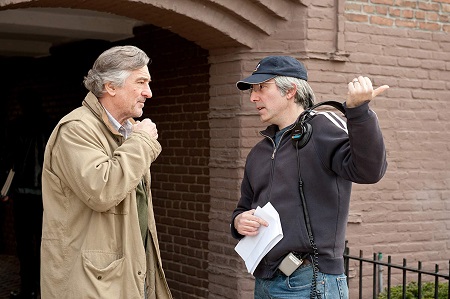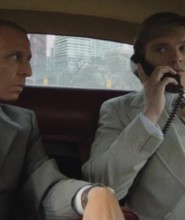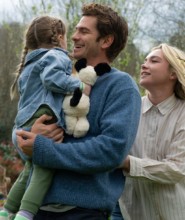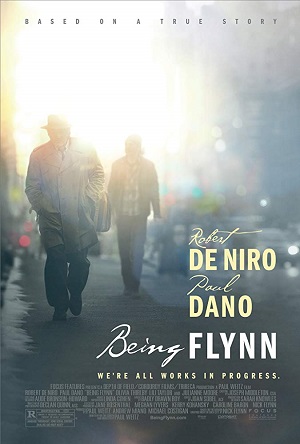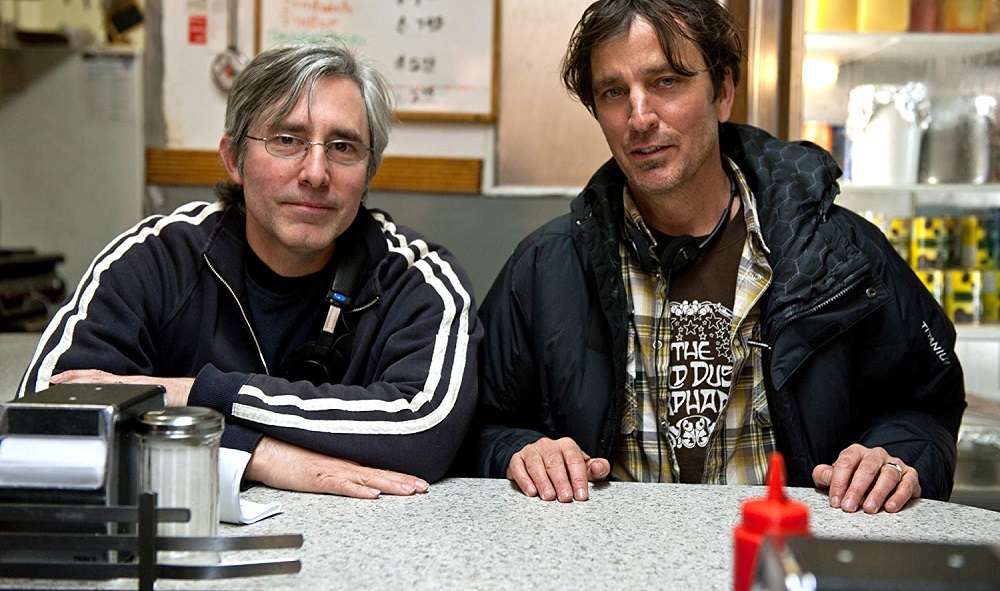
“Being Flynn” – Interview with Paul Weitz
by Sara Michelle Fetters - March 15th, 2012 - Interviews
State of Being
Paul Weitz Recharges Batteries with Nick Flynn’s Memoir
Paul Weitz couldn’t wait to make Being Flynn. Coming off of the trying experience of making Little Fockers, admittedly a gigantic box office hit for Universal, diving into an adaptation of Nick Flynn’s acclaimed memoir Another Bullshit Night in Suck City was just what the respected writer/director needed to recharge his batteries. “I had read [the book] well before making Fockers, and I honestly think I’ve made three films, American Dreamz, Cirque du Freak and Fockers, while I was writing the screenplay for this one,” he says with a smile. “But when that one ended, I knew I needed to get to work on this now. The time felt right.
“Little Fockers was such an experience. If you wrote a memoir about the gamut of the filmmaking experience going from Little Fockers to [Being Flynn] I don’t think anyone would believe it was true. Little Fockers was to me like being a 1930s or ‘40s studio filmmaker where you’re assigned to a project and you’re trying to be in service to something. It was great that I got to meet certain idols of mine like Barbara Streisand and Dustin Hoffman, but it was also incredibly psychologically challenging where it was not a situation where I was able to hang myself to my own designs. It was really hard to get through that movie. Literally.”
All of which made moving into the smaller, independent production just what the doctor ordered. “In a way I feel like I’m somebody who sometimes needs a slap in the fact to clear their head,” Weitz admits candidly. “This movie, now called Being Flynn, the MPAA wasn’t having the original title, was really personal to me, even though it was about somebody else’s life story. The fact I was feeling like I didn’t achieve all I wanted to with Little Fockers made it all the more important to go down guns blazing with this one and not to be doing it for any other reason than to realize the vision I felt it [the book] was all about.”
Being Flynn revolves around Nicolas Flynn, played by Paul Dano, a somewhat lost twenty-something who takes a job at a New York homeless shelter in order to find some direction in his life. Things begin to spiral out of control when his long-lost father Jonathan (Robert De Niro), the self-described third greatest American writer ever, walks through the door looking for a bed for the night.
Both the memoir and the movie understand the creative process, the travails and hardships associated with being a professional writer; the ennui, the self-loathing, the amount of ego required to think you have the talent and the ability to craft something others will want to read coupled with the merciless dread no one will actually do so. “Creating something is an utterly personal thing,” states Weitz. “One of my touchstones in life is going back and reading Van Gogh’s letters to his brother because there is somebody working only for the pure love doing the art. He doesn’t think he’s as good an artist as [his contemporaries], most of whom are now looked upon as lesser painters. He doesn’t believe he is going to make a living with his art. He’s just trying to make enough money to buy paint.
“I go back to that as an extreme example, but I also think it bears upon what someone might think about Jonathan Lynn and is one of the things that drew me to the memoir. A problematic character, in some ways a horrible person, but who’s to say that the scribbling he’s doing on the back of envelopes and this novel he’s been writing for decades what someday be judged as a masterpiece? Going back to Van Gogh, he never expected to sell [his paintings], much less be the most lauded painter of all-time.”
The nastiness of Jonathan could in lesser hands be a massive problem, a dreary dark cloud making everything around him a depressing muddle difficult to maintain interest in. But in the hands of De Niro, an actor who could easily be accused of sleepwalking through the majority (with a handful of exceptions) of his performances going back a decade, the man is a consistent puzzle. The iconic Oscar-winner never shies away from the egotistical drunkard’s more disreputable attributes yet at the same time still keeps him someone viewers will be able to sympathize with.
“I’d hear from people who have known De Niro for over 20 years,” relates the director, “people like his costume designer or his trainer, how hard he was working. He was constantly going over his lines, many of which are non sequitur because [Jonathan] is constantly rambling, delivering his monologues stream of consciousness style, all of which are really hard to memorize and make sound authentic.
“A month before shooting I went out with him because there was a blizzard and we needed snow for a section of the movie and we weren’t really even in production yet, there weren’t any costumes or anything, but he took what he had and we grabbed a cameraman and we zipped around in a car to various locations without any permits and shot things as if this were a student film. It was real guerilla-style, and it was moving to me to be around someone who didn’t have to work in that way anymore, had paid his dues and made his mark, and was still willing to invest so much of himself into the character and into the movie, especially considering how complicated Jonathan is as a character. Whether it be Travis Bickle or Jake La Motta, De Niro has an ability to play people who are truly horrifying. Yet he always finds a way to bring you really close to them.”
But when you think about some of the best motion pictures involving writers, whether they be old Hollywood classics like The Lost Weekend or 21st century variations like Wonder Boys or Adaptation, the great ones aren’t afraid to show these individuals warts and all, don’t care if they alienate a portion of the audience by delving into every last ounce of their depressing insecurities. This sort of honesty is what sets them apart, and even if Being Flynn doesn’t quite rise to the same sort of level it isn’t because Weitz, his cast or anyone else involved with the production wasn’t prepared to lay every last ounce of themselves on the line to see it happen.
“I’m glad you noticed that,” says the director with a smile. “That stuff is all there in Nick’s memoir, and it was important to me to make sure we stayed true to that feeling and milieu in the movie. The two writers here couldn’t be any more different, but at the same time so much the same. The younger one is desperately trying to disassociate himself from his father but at the same time wants what his father has, which is a confidence to survive; to break away from a false feeling of control over life.
“Here’s the thing. In this film Nick is learning to be a writer in the way I like to approach creativity in that it’s a job, it’s got its ups and downs, and basically it is something you have to devote yourself to in the same way one of the gaffers on the film devotes themselves to their profession. While he’s looking for shelter and investing himself in this job that he’s actually good at, he’s also becoming a writer. He’s working at it, gathering material, living life, making mistakes and attempting to learn from them. Jonathan Flynn is grandiose because he believes himself to be one of the greatest writers who has ever lived. Nick Flynn is grandiose because he is feeling guilty because he wrote a short story that his mother read on the day of her death.”
In some ways the biggest challenge in making a movie like this one is that many of the characters depicted within the narrative are still very much alive, living (and, at least in the case of Nick, writing) in New York this very day. “The actors have to feel like they’re doing justice to the person but at the same time not doing an imitation,” Weitz explains. “I will tell you, one thing I learned on Little Fockers because I had so much collaboration thrust upon me is that my capacity to collaborate in a healthy way, in a much healthier way on this movie, was greater than I thought it was. I was not as possessive as I might have been.
“Nick Flynn was around, read every draft I wrote and was there during shooting. But Nick is an artist and a truly generous spirit, and I think he would have been unhappy if I didn’t feel like this was a personal movie for me and that I didn’t feel like I could call my own shots. He’s been through too much shit to let his ego get the best of him. He has an ego, he tells me he does, and he certainly gave his opinions about things, but the final decision was always mine. He loves creation, loves seeing things come together in an artistic way, so having him around was like having a good angel on set.”
And Jonathan? Did he and De Niro ever meet? “That was quite an experience,” chuckles Weitz. “Being able to go out with Nick and De Niro and meet Jonathan and see how egotistical he still is, it was something. The fact that when he met De Niro, Jonathan wasn’t intimated in the least, just asking him if he thought he was going to be able to pull portraying him off.
“And that was a great artistic license for De Niro, because he realized he could in turn be as egotistical or as naked or as raw or whatever else he wanted to be in portraying Jonathan, because the real Jonathan wouldn’t have had it any other way. De Niro is clearly not a racist or a homophobe, but he’s playing a character who is, and it is interesting to me to see people going to aspects of a personality they do not in fact possess themselves. He just went for it, and watching him work in that way I found very inspiring.”
There is a weird irony in that this dark, highly personal movie filled with despair, no matter how tinged with comedy and reverie as it may be, is coming out barely a month ahead of American Reunion, the decade later sequel to the R-rated teen comedy smash American Pie that put Paul and his brother Chris Weitz on the Hollywood map. It is an irony not lost on the director. “It is kind of odd,” he admits with a crooked smile. “There’s a unique full circle symmetry there that’s kind of hard to miss.
“Honestly? It’s really nice. I want to own that experience in life, the fact that Chris and I were able to make the most of that situation. I’m very proud of American Pie. It’s allowed me to run the gamut between studio filmmaking and independent filmmaking. I love watching Darden brothers films but I grew up watching studio films like Imitation of Life. I have a sense of both things, and I’d like to not restrict myself in what I find meaning in. In this case, I really like American Reunion. I think they did a great job.
“Listen, our attack on the first film was to make a feminist version of a teen sex comedy. I’m not sure that’s been anybody else’s attack on this material since then, but that was what we were consciously trying to do. Beyond that, without judging anything from that spectrum, I really liked seeing these guys together after not seeing them onscreen together for over seven years. It’s nice.”
As for Being Flynn, Weitz hopes audiences head to the theatre and take a chance on the film, sure they’ll walk away with much to ponder if they do. He’s proud of the movie, glad that he didn’t pull any punches, happy that he went to so many dark and bleakly comic corners in order to bring Nick Flynn’s memoir to life.
“There’s certainly a feeling in Hollywood that only a certain behemoth style of film can be made now,” says Weitz matter-of-factly. “That makes filmmakers feel rebellious. Makes many of us want to take a risk. I’m interested in looking back on things twenty years from now, looking back at an entire body of work.
“But for now, I want audiences to feel like as they’re witnessing these sort of experiences they’ve never had themselves that there are elements that they can’t help relating to personally. I want them to think about their lives, about their parents, about how it all fits together. Everybody has humor, some sense of irony about their own lives, something that gets them up in the morning. I find that very realistic and a great lesson on how to get along in life.”
– Interview reprinted courtesy of the SGN in Seattle
